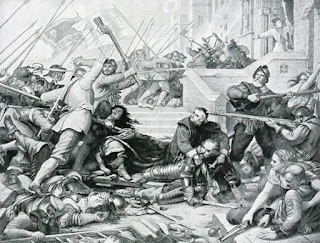You hear more and more the refrain that what we need is another Cromwell to sort out our perceived decline and sectarian divisions. The desire is understandable, but all I can say is, be careful what you wish for. The only small mercy is that ‘Great Men’ never emerge from wishes alone. I remember, at eighteen, being an ardent Leninist but knowing revolutions don’t work like that. Revolutions from the Left, Right, or any new future quantum angle come about whether wished for or not.
Men with the historical significance of a Cromwell, a Lenin, Stalin, Mao, Hitler or a Franco don’t come from nowhere. They emerge from war and profound social and economic breakdown. Such events may be inevitable but nothing you would actively wish for.
Ah but Cromwell was different. You can’t compare him to psychopaths like Stalin or Mao. He was English for God’s sake. ‘God’s Greatest Englishman.’ And you can’t compare the English civil war to the Russian Revolution. As a child I believed that. I believed the English civil war was romantic; ringlets and cloaks, fine leather boots, horses and swords, the ‘Devil-May-Cares’ against the ‘Kill-Joy-Puritans.’
The famous painting 'When did you last see your father?' The small boy quizzed by grim faced Puritans, all of them dressed in their Sunday best
In reality the conflict was deeply sectarian, passions ignited by hatred, religious divisions, corruption and economic hardship.
Both sides were guilty of dehumanising and despite established rules of conduct massacres became increasingly common.
At Shelford Manor near Nottingham 160 Royalist soldiers were slaughtered along with women and children. The Puritan attack was so frenzied because they were fighting soldiers from the Queen’s regiment— mostly European and every one of them Catholic. Foreign Catholics. A red rag to all right thinking Englishmen. Think English Defence League vs a Bangladeshi Muslim detachment. Think Srebrenica.
Atrocities came from both sides. Bolton, fiercely puritanical held out against the dashing Prince Rupert, beating back four of his regiments. Rupert ordered a second attack led by the Earl of Derby. Fuelled by sectarian anger, the Royalists successfully stormed the walls and the results were bloody and brutal. 1,600 Puritans were slaughtered and the town plundered, its women raped. It’s worth noting that when Liverpool was attacked by Rupert, its soldiers decamped across the Mersey to Birkenhead. Wise men though lacking discernment. Birkenhead.
The Royalists were equally brutal at the village of Barthomley, a detachment led by Major Connaught surrounded a church where the villagers had fled, taking refuge in the steeple. Connaught promised them quarter. When the hapless villagers descended they realised their mistake:
‘…but when hee ha theim in his power, hee caused theim all to be stripped starke naked; And moste barbarouslie and contrary to the lawes of Armes, murthered, stabbed and cutt the Throates of xii of theim and wounded all the reste, leaving many of theim for Dead.’
Lord Byron, the Royalist commander at Chester thoroughly approved, writing to the Duke of Newcastle, ‘…the Rebels had possessed themselves of a Church at Bartumley, but wee presently beat them forth of it, and put them all to the sword; which I finde to be the best way to proceed with these kind of people, for mercy to them is cruelty…’
Hopton Castle, a Parliamentary stronghold in a Royalist area was commanded by Samuel Moore in control of 30 men. In 1664 the garrison was besieged by Sir Michael Woohouse with a royalist force of 500 men. After weeks of valiant fighting, Moore at last surrendered on agreed terms. As they marched out the garrison was massacred, the men bound together in pairs, their throats slit, their bodies tossed in the moat.
At the battle of Naseby, 12,000 Royalist troops faced 15,000 Parliamentarians led by Sir Thomas Fairfax and Oliver Cromwell. Behind both armies were the baggage trains and women ‘camp followers.’ The battle began at 10 am. By 3.30 pm the king’s men were in full retreat leaving their ‘camp followers’ to the tender mercies of God’s Own Army. Protestant rage was unleashed on the hapless women, many of them Welsh. Confusing the Welsh language with that of the Irish, they massacred three to four hundred of them on the spot. Others were systematically disfigured:
‘…the rest of the whores that attended that wicked army, are marked in the face of nose with a slash or a cut.’ It was a common punishment for ‘the whore’— the nose slit or sometimes cut off.
I was so wrong as a child. The Civil War was no gentlemanly game, and the violence was immense. In England and Wales alone, a larger proportion of the population died than in the First World War. And don’t get the Irish started on their casualties when Cromwell went over there. What we need is a Cromwell. Maybe. Equally, be careful what you wish for.





















